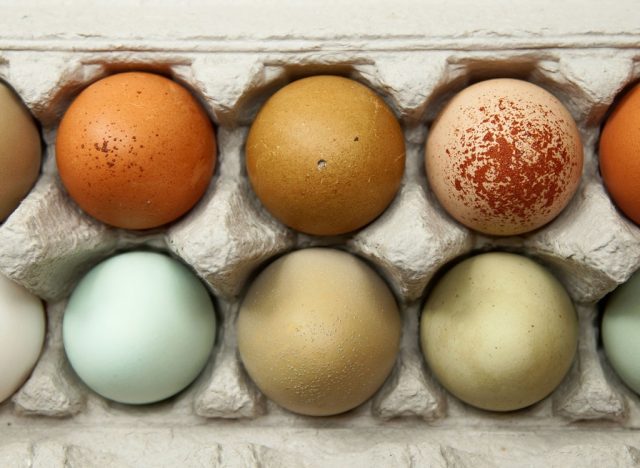Rice, bread, flour…some foods just seem more nutrient-dense when they’re brown. But does this rule apply to eggs, too? Many folks think that brown eggs are superior to their white-shelled counterparts, but this isn’t actually true. Choosing a carton of brown eggs over the more budget-friendly white ones all comes down to personal preference.
Whether you think brown eggs look more aesthetically pleasing as part of certain recipes or they just happen to be on sale at the grocery store, the color of the shell doesn’t influence the eggs’ taste, texture, or nutrition.
We spoke to nutrition experts on what the real differences between white and brown eggs are and what you need to know about their nutrition quality. Regardless of the type you buy at the grocery store, you’ll also want to read up on the 10 Science-Backed Effects of Eating Eggs Every Day.
What’s the difference between brown eggs and white eggs?


This may come as a surprise, but the only actual difference between brown and white eggs is exactly that—the color.
“The difference between brown eggs and white eggs is simply the color of the eggshell,” says registered dietitian Crystal Scott, MS, RD, a registered dietitian with Top Nutrition Coaching.
“Brown eggs are laid by breeds of chickens with red or brown feathers, while white eggs are laid by breeds of chickens with white feathers,” explains Scott. “The breed of chicken determines the color of the eggshell,” she adds. So, it all boils down to the type of chicken and its genetics.
The color of eggs hens can lay ranges anywhere from white to brown to speckled, and some lay other wild colors like pale blue or a light bluish-green, says Megan Hilbert, MS, RDN, a registered dietitian with Top Nutrition Coaching.
According to Texas A&M AgriLife Extension Service, leghorn chickens lay white eggs, while Orpington chickens lay brown eggs. (Meanwhile, other chicken breeds, like the Ameraucana, lay blue eggs.)
Taking a look at the chickens’ earlobes will also give you an indication as to what color eggs they will lay. Chickens with light earlobes typically lay white eggs, while chickens with darker earlobes generally lay brown eggs, per Texas A&M AgriLife Extension Service. However, we must admit looking at the feathers might be a lot easier than trying to locate a bird’s earlobes.
Common misconceptions about the color of eggs
Some folks think that brown eggs are fresher or more “natural” than white eggs, and some even assume white eggs are bleached and, therefore, more processed and chemically altered, Hilbert says. Rest assured that none of these myths are actually true. However, it’s breed of chicken determines the color of the eggshell—not the nutrition of the egg, Scott reminds us. Regardless of the shell color, all eggs are a solid source of protein, selenium, vitamin A, and B vitamins, as well as brain-supporting choline, according to the USDA.
READ RELATED: 11 Best Canned Tunas on the Market, and 3 to Stay Away From
So if your goal is to buy the healthiest type of eggs, you shouldn’t be looking at external factors. “The chicken’s diet and living conditions can tell you more about the eggs’ nutrition than the shell color can,” says Scott.
Why are brown eggs more expensive than white?


Nutritionally speaking, brown eggs aren’t worth the higher price tag. So why are they more expensive in the first place?
“The reason why brown eggs are often more expensive than white eggs is that the breeds of chickens that lay brown eggs tend to be larger and require more food, space, and care than the breeds that lay white eggs,” says Scott.
What’s more, hens that lay brown eggs lay slightly larger eggs, and these eggs take a little bit longer for them to lay. “This is because an extra process is required during egg formation for the shell to be ‘coated’ with the brown outer layer,” Hilbert says. Hens who lay brown eggs typically also lay fewer eggs overall.
All of these factors can make raising and maintaining brown egg-laying chickens more expensive, which is reflected in the price of their eggs.
Brown eggs vs. white eggs—which is healthier? The verdict
In terms of healthiness, there is no significant difference between brown eggs and white eggs. Both types of eggs contain similar amounts of protein, fat, and other nutrients, Scott says.
“The nutritional content of an egg is largely determined by the chicken’s diet and living conditions—therefore, it is important to choose eggs that are produced by healthy and well-cared-for chickens, regardless of their color.”
That said, the best type of eggs is those that are pasture-raised, Hilbert says. “Research has found that pasture-raised eggs contain more omega-3 fat, more vitamin D, and more beta-carotene (vitamin A) than hens raised on traditional feed,” Hilbert says. “Because they can eat more closely to their natural diet, these hens are also happier and healthier.”
All in all, eggs should be a staple in your diet if you’re looking for a budget-friendly source of quality nutrients. Eggs, regardless if they are pasture-raised or not, are an excellent source of vitamins D, E, K, A, omega-3s, B vitamins, zinc, and choline, Hilbert says.
“They are one of the more cheap and accessible protein sources, so those looking to boost their nutrition and stay on a budget will find eggs to be perfect.”











